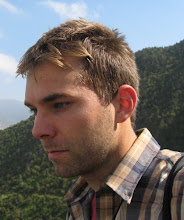
Several nights ago I sat alone at home while dinner cooked, texting members of my first host family to congratulate them on the start of Ramadan. Outside, the glowing streetlamps illuminated a seemingly abandoned neighborhood-- the normal buzz and rumbling of passing motorbikes and voices was replaced with absolute stillness as people retreated indoors to break the day's fast together.
I thought of last year in Itzer, nine people packed into a tiny room around a table on top of which a feast was presented, all quietly listening for calls of "Allahu Akbar" to echo their way into the house. I recalled the discolored walls, the hiss of a pressure cooker from another room, the incomprehensible activity taking place on the television, the frenzy of hands reaching forward to grab and pluck, the almost unbearably awkward task of eating amongst them, and the dreamlike, removed sensation of really being there, here in Morocco.
As the vegetables sizzled in my kitchen, I felt a twinge of melancholy-- I missed that rush of unpredictable moments, the confused and broken interactions, the chilled air, the smell of burning cedar (a scent that will likely forever take me back to that time), that grand, invigorating newness of it all that has somehow, bit by bit, been replaced by normalcy. I have privacy, independence, and all the time to myself I could desire-- the things I initially craved so much. People in the street often ask me, "Are you used to it here yet?" and it's strange now to answer with an honest "yes".
There is something compelling in witnessing the communal suffering of Ramadan. It's seeing first-hand the devotion and certainty in a people's relationship to their faith. I pass by workers mixing cement by hand and making bricks under the heat of the day, and I know that the thirst they must be feeling won't be relieved for hours to come, nor will the work. The persistent ache of hunger that I've only felt briefly and on rare occasions will be present with them for the next thirty days. The same for my good friends who take walks and muse cheerfully to pass the long daylight hours, and for the women, perhaps the toughest of them all. I hear no complaints, and those with whom I discuss Ramadan speak of it with reverence and gratitude. I stop briefly to chat with my vegetable man: "Are you hungry?" I ask, jokingly. "Hamdullah," he smiles-- "Thank God."
I thought of last year in Itzer, nine people packed into a tiny room around a table on top of which a feast was presented, all quietly listening for calls of "Allahu Akbar" to echo their way into the house. I recalled the discolored walls, the hiss of a pressure cooker from another room, the incomprehensible activity taking place on the television, the frenzy of hands reaching forward to grab and pluck, the almost unbearably awkward task of eating amongst them, and the dreamlike, removed sensation of really being there, here in Morocco.
As the vegetables sizzled in my kitchen, I felt a twinge of melancholy-- I missed that rush of unpredictable moments, the confused and broken interactions, the chilled air, the smell of burning cedar (a scent that will likely forever take me back to that time), that grand, invigorating newness of it all that has somehow, bit by bit, been replaced by normalcy. I have privacy, independence, and all the time to myself I could desire-- the things I initially craved so much. People in the street often ask me, "Are you used to it here yet?" and it's strange now to answer with an honest "yes".
---------------------
There is something compelling in witnessing the communal suffering of Ramadan. It's seeing first-hand the devotion and certainty in a people's relationship to their faith. I pass by workers mixing cement by hand and making bricks under the heat of the day, and I know that the thirst they must be feeling won't be relieved for hours to come, nor will the work. The persistent ache of hunger that I've only felt briefly and on rare occasions will be present with them for the next thirty days. The same for my good friends who take walks and muse cheerfully to pass the long daylight hours, and for the women, perhaps the toughest of them all. I hear no complaints, and those with whom I discuss Ramadan speak of it with reverence and gratitude. I stop briefly to chat with my vegetable man: "Are you hungry?" I ask, jokingly. "Hamdullah," he smiles-- "Thank God."


No comments:
Post a Comment